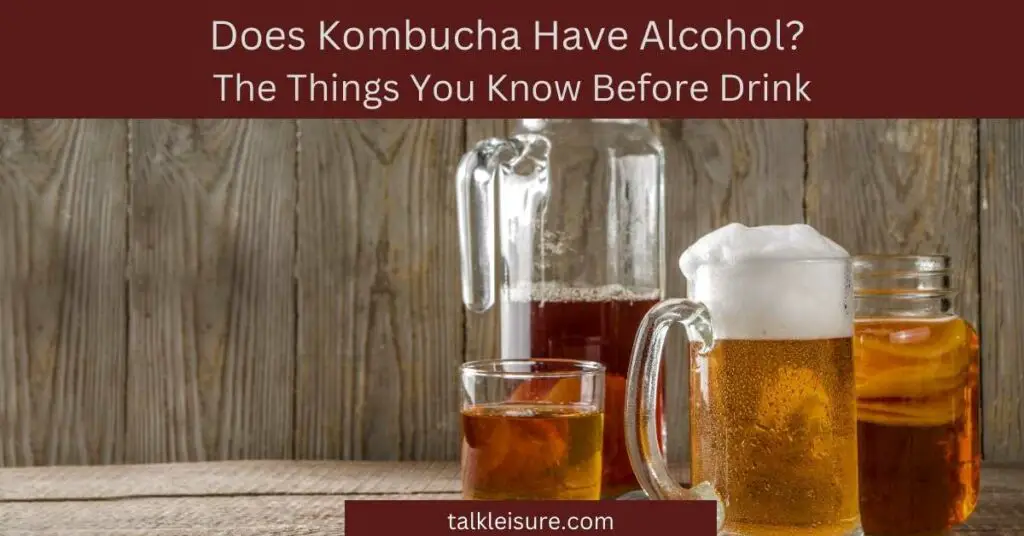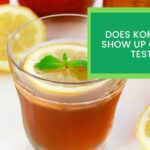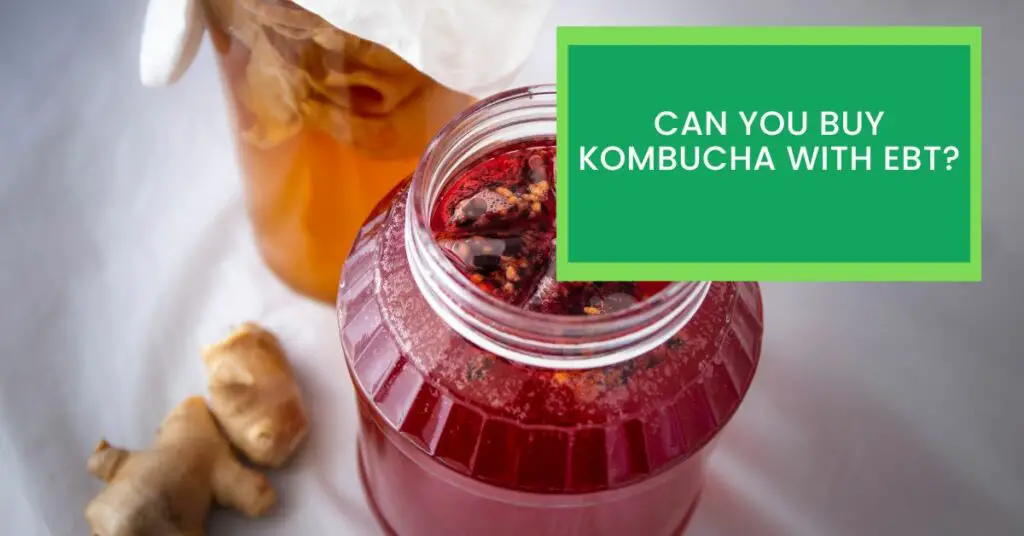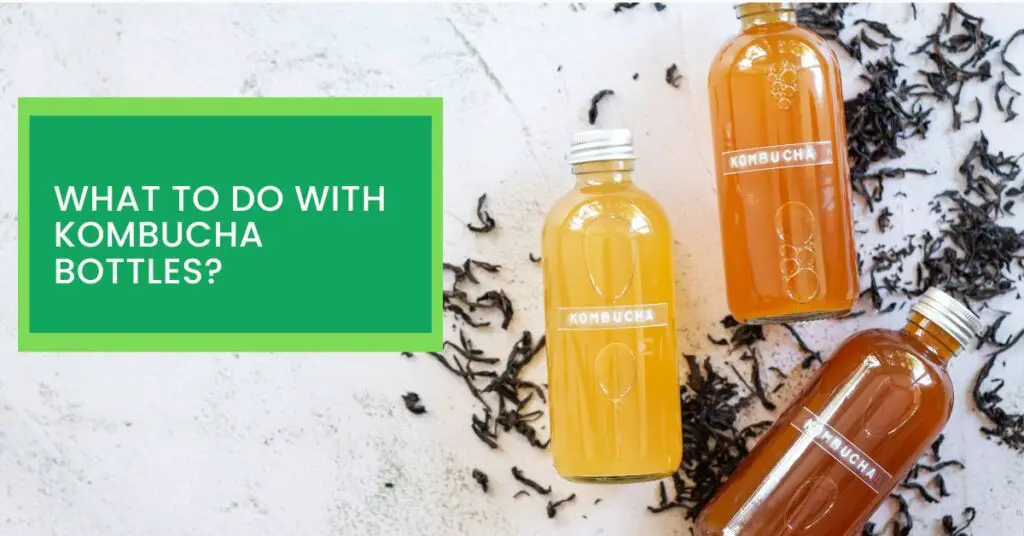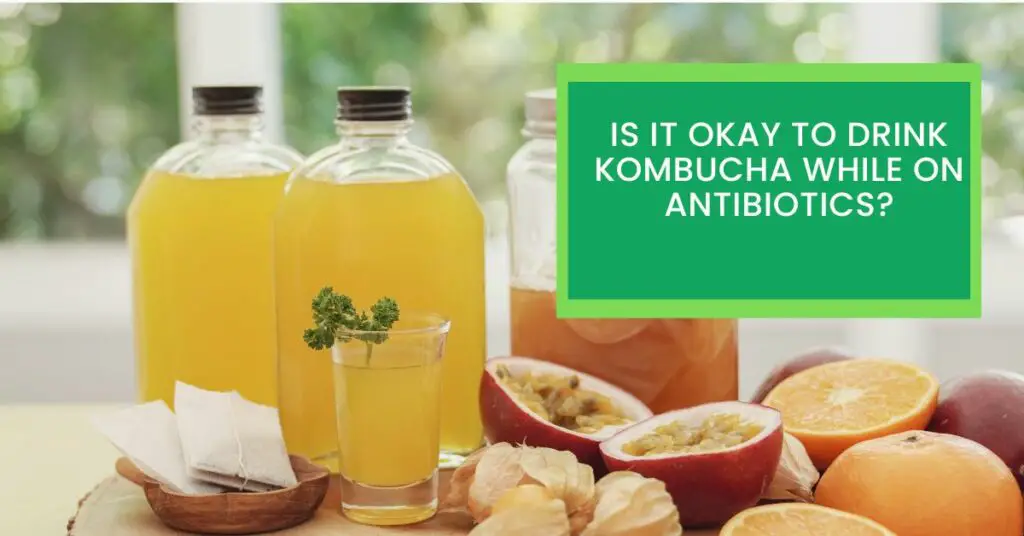Are you a fan of kombucha but worried about to know does kombucha have alcohol? As a naturally fermented beverage, kombucha contains trace amounts of alcohol that vary from brew to brew.
But don’t worry, the alcohol levels in most commercially available kombuchas are minimal, ranging around 0.5% ABV.
This technically makes it non-alcoholic, although homemade versions may have a higher alcohol content.
In this article, we will dive deeper into the world of kombucha and explore its unique fermentation process, the factors that affect its alcohol content, and how you can enjoy this probiotic-packed beverage without the buzz.
Brief Overview Of The Question: Does Kombucha Have Alcohol?
Kombucha, a fermented tea beverage that has gained popularity in recent years, has sparked a lot of curiosity about its alcohol content.
The answer to the question, “Does kombucha have alcohol?” is yes, it does.
Kombucha is made through a process of fermenting tea with sugar and a colony of bacteria and yeast known as SCOBY.
During this fermentation process, the yeast converts the sugar into ethanol (alcohol) and acetic acid.
The amount of alcohol in commercially available kombucha is generally low, with most brands containing around 0.5% ABV, which theoretically makes it non-alcoholic.
However, homemade versions and some commercial brands may have a higher alcohol content.
Despite that, drinking kombucha is unlikely to lead to intoxication, and many people enjoy it as a non-alcoholic alternative to other beverages.
How Kombucha Is Made?
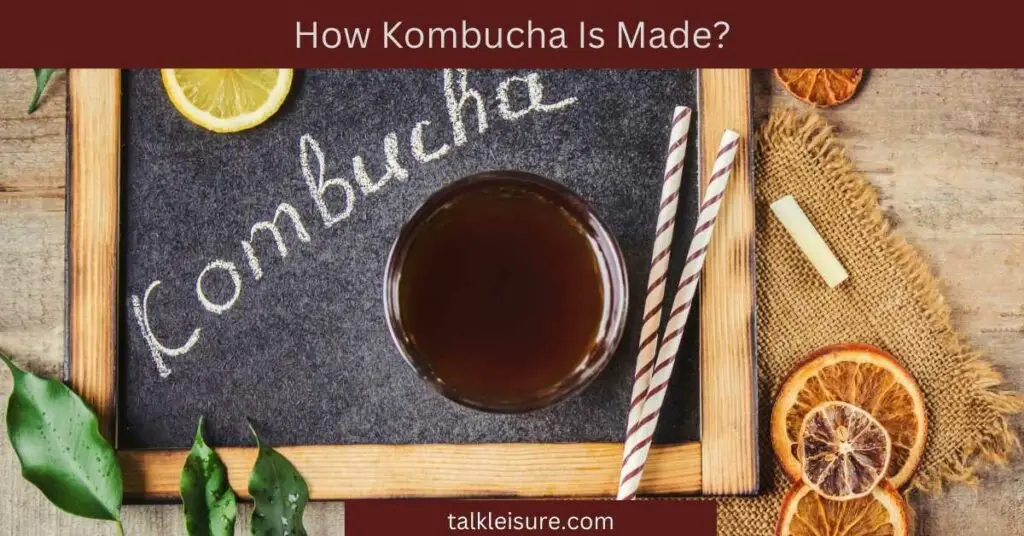
Kombucha is a fermented drink that is made with four simple ingredients: tea, sugar, bacteria, and yeast.
To make Kombucha, start by adding sugar to brewed tea and then allowing it to cool.
After this, add the Kombucha culture of bacteria and yeast to the tea, also known as SCOBY, and cover it with a cloth to let it ferment.
During the fermentation process, the SCOBY will consume the sugar in the tea, producing carbon dioxide, organic acids, and trace amounts of alcohol.
As the tea continues to ferment, the carbon dioxide will increase, and a layer of bacteria will form.
The end result is a slightly fizzy, tart, and tangy drink that has probiotic properties.
The length of the brewing time and the types of yeast strains used can also impact the alcohol content of the final product.
Overall, the process of making Kombucha is easy and simple, and it produces a delicious drink that offers a range of potential health benefits.
Fermentation Process – In Detail
The fermentation process is integral to the creation of kombucha and is what gives this drink its unique flavor and characteristics.
To make kombucha, a mixture of bacteria, yeast, tea, and sugar is left to ferment for several weeks at room temperature.
During fermentation, a SCOBY – a living symbiotic colony of bacteria and yeast – is formed on the surface of the tea.
This SCOBY breaks down the tea’s sugars and converts them into carbon dioxide and acids, resulting in a fizzy and tangy drink.
The SCOBY itself is comprised mostly of cellulose, a type of insoluble fiber, and hosts a variety of yeast and bacteria species that aid the fermentation process.
If you want to brew your own kombucha, obtaining a SCOBY is the first step – you can buy one online or from a health food store, borrow one from a friend, or even grow your own using raw, unflavored kombucha and sweetened tea.
Does Kombucha Have Alcohol In It?
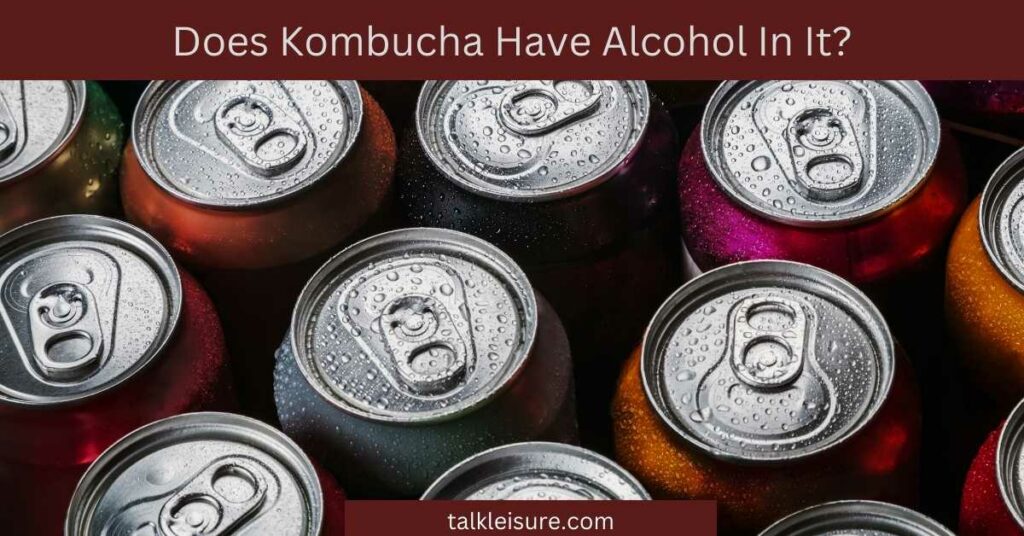
It’s important to understand that kombucha contains a naturally-occurring alcohol from the fermentation process.
While the alcohol content can vary depending on the brand and brewing process, it’s generally a very low trace amount.
Kombucha is not brewed to be intentionally intoxicating, and commercial brands make an effort to keep their alcohol levels below legal limits.
However, it’s worth noting that homemade kombucha can have a higher alcohol content if brewed improperly.
It’s unlikely that drinking too much kombucha will get you drunk, but if you’re particularly sensitive to alcohol or have health reasons for avoiding it, you should be aware that there are small amounts present.
Just keep in mind that alcohol is a natural byproduct of fermentation, and it can’t be fully avoided in kombucha or other fermented foods.
Different Brands Of Kombucha And Their Alcohol Levels
The alcohol content of kombucha can vary greatly between different brands.
Some brands contain only small amounts of alcohol, while others can contain up to 8% alcohol.
It all depends on the fermentation process and the type of tea used.
Additionally, some commercial brewers use various processes for removing alcohol from their brews, which can also impact the alcohol content.
However, it’s important to note that even “low-alcohol” kombucha still contains trace amounts of alcohol, which can impact individuals who are sensitive to alcohol or who need to avoid it for religious, dietetic, or personal reasons.
That being said, most commercially-available kombuchas have a very low alcohol content, and it would be difficult to get drunk from drinking them.
When choosing a brand of kombucha, it’s important to read the label carefully to determine its alcohol content.
Is Drinking Kombucha Make You an Alcoholic?
When it comes to determining what makes a drink alcoholic, the key factor is the presence of ethanol.
Ethanol is a type of alcohol that is produced through the process of fermentation, which occurs when yeast and sugar combine and convert into alcohol.
In the case of kombucha, the fermentation process involves a combination of tea, sugar, bacteria, and yeast.
This process produces a small amount of ethanol, which can vary from brand to brand.
However, it is important to note that the alcohol content in most commercially available kombuchas is very low, typically less than 0.5% ABV. Drinks are only considered alcoholic if they contain more than 1.2% ABV.
This means that while technically containing alcohol, kombucha is still considered a non-alcoholic beverage.
Overall, the relatively low levels of alcohol in kombucha make it a safe and healthy alternative to traditional alcoholic beverages.
How much Alcohol is in Kombucha?
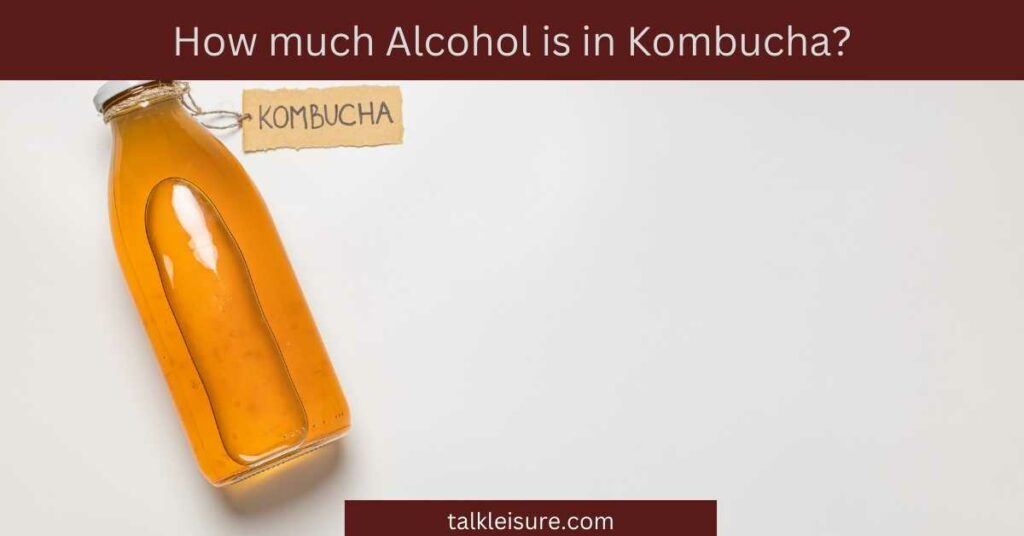
Average Alcohol Content in Commercially-available Kombuchas
In, commercially-available kombucha has a minimal alcohol content of around 0.5% ABV.
This makes it technically non-alcoholic, as drinks are only considered alcoholic if they contain more than 1.2% ABV.
However, it’s important to note that alcohol content may vary between different brands of kombucha, as well as based on the specific brewing process and type of yeast used.
Homemade kombucha can also have a higher alcohol content due to the lack of regulation in the brewing process.
As a result, it’s essential to check the label of your kombucha and only buy unpasteurized, organic versions.
While low in alcohol, kombucha is not recommended for those who are especially sensitive to alcohol or have health or religious concerns about consuming it.
Nevertheless, the small amounts of alcohol in commercially-available kombuchas are not enough to get anyone drunk.
Higher Alcohol Content in Homemade Kombucha
It’s important to note that homemade kombucha can have a higher alcohol content compared to commercial kombucha.
This is because the alcohol content can increase the longer the kombucha ferments and the type of yeast used in the process can also affect the level of alcohol produced.
As a result, it’s essential to carefully monitor the brewing time and yeast strains to ensure that the alcohol content doesn’t exceed your desired level.
However, it’s worth emphasizing that even the highest alcohol content you can get from homebrewed kombucha isn’t likely to exceed 2% ABV, making it difficult to get drunk from drinking it.
Ultimately, it’s up to personal preference whether to make your kombucha or purchase a commercially available one, but it’s good to be aware of the varying alcohol levels in kombucha products.
Is “Hard Kombucha” A High Alcohol Kombucha?
Yes, “hard kombucha” is a type of high alcohol kombucha intentionally brewed to have a higher alcohol content, typically above 3%.
This is achieved by adding additional sugar and other strains of yeast for further rounds of fermentation.
During this process, the sugar is further fermented for up to 10-14 days, resulting in an increased alcohol percentage of up to 11%.
Unlike traditional kombucha, which typically has less than 0.5% ABV, hard kombucha is made with the intention of being an alcoholic beverage.
However, it should not be confused with beer, as it is made from tea leaves rather than wheat.
While hard kombucha may have lower calories and less sugar than other alcoholic drinks, it should not be viewed as a health beverage due to its high alcohol content.
What is Raw Kombucha? Which Kombucha Has Most Alcohol?
Raw kombucha is a type of kombucha that is unprocessed and unpasteurized.
It is commonly found in health food stores and is known for its benefits to gut health due to the presence of probiotics.
However, raw kombucha can also have a higher alcohol content compared to pasteurized versions.
The amount of alcohol in kombucha varies between brands and brewing methods, with homemade kombucha often having the highest alcohol content.
It is important to check the label and brewing time to ensure you are consuming unpasteurized organic kombucha.
Commercially-produced kombucha are required to have an alcohol content of less than 0.5% to be sold as non-alcoholic beverages.
If you are particularly sensitive to alcohol or have specific health concerns, it is always best to talk to your doctor before consuming kombucha.
Where To Buy Alcoholic Kombucha?
If’re looking to buy alcoholic kombucha, there are a few options available.
Physical stores like Trader Joe’s, Target, and Costco carry some brands, but you may have more luck ordering online.
One popular online liquor store is Drizly, which offers over 280 different hard kombucha products from top brands.
You can choose to have your order shipped via a third-party courier like FedEx or UPS, or opt for delivery through a retail partner.
Another option is using grocery delivery apps like Instacart, which operates in all 50 US states. Many well-known brands that sell hard kombucha also offer local and international shipping.
Just be sure to check their delivery fees and policies before placing an order. With all these options available, you’ll be sipping on your favorite hard kombucha in no time.
How to Reduce Alcohol Content in Kombucha
Commercial kombucha can be made non-alcoholic through different alcohol removal processes.
One common method used is pasteurization, a heat treatment that kills off the yeast in the drink, stopping the fermentation process and preventing further alcohol formation.
Another process is vacuum distillation, which removes the alcohol through evaporation. This method is a gentle way to remove the alcohol while preserving the flavor and quality of the drink.
Reverse osmosis is another process that can be used to remove the alcohol. This process involves passing the liquid through a filter that separates the alcohol from the water and other components in the drink.
Finally, some breweries use proprietary methods to remove the alcohol while preserving the live cultures and flavor profile of the finished product.
Knowing the different alcohol removal methods used by commercial kombucha producers can help consumers make informed decisions about the products they choose to consume.
Is There Alcohol Free Kombucha?
If you’re looking for an alcohol-free beverage, there are definitely options for you when it comes to kombucha While it’s true that all kombucha contains some alcohol due to the fermentation process, some brands have found ways to remove this naturally occurring alcohol and create a non-alcoholic version.
Some commercial brewers use various processes for removing alcohol from their brews, such as using non-fermentable sugars or vacuum distillation.
Additionally, some brands may simply have a lower alcohol content due to a shorter fermentation process or the use of different yeast strains.
It’s important to check the label and do your research to ensure you’re purchasing an alcohol-free kombucha.
At Buchi, They pride themselves on creating a delicious and non-alcoholic kombucha through a proprietary process that doesn’t involve the use of preservative chemicals.
FAQ
Q:Is it OK for kids to drink kombucha?
A:store-bought pasteurized kombucha is safe to give to children ages 4 and older, with limits of 2-4 ounces (60-120 mL) per day to stay within the daily recommended sugar intake. Homemade and unpasteurized versions should be avoided, as they may contain higher alcohol content. It is recommended to choose low sugar or unsweetened varieties to reduce the risk of cavities, childhood overweight, and heart disease or diabetes later in life.
Q: Is 0.5 alcohol halal?
A: It depends on the context. According to Islamic scholars, a beverage that contains less than 0.5% alcohol is considered permissible as long as it does not cause intoxication. However, some may consider any amount of alcohol to be haram (forbidden).
Q Can you buy kombucha under 21?
A: In most cases, yes. Most commercially produced kombucha is non-alcoholic, meaning it does not contain enough alcohol to be classified as an alcoholic beverage by the FDA. Therefore, at most stores, minors should be able to buy kombucha without being ID’d. However, some stores may still ID anyone who buys it due to concerns about the varying alcohol content in kombucha.
Q: How much alcohol is in kombucha?
A: Kombucha can vary in its alcohol content from 0.5% to 3.0%. Any kombucha sold in stores, unless it’s hard kombucha in the alcohol section, should have less than a 0.5% alcohol content. However, improper storage during transport or at the store can cause the alcohol level to increase. Home-brewed kombucha can have a higher alcohol content, up to 3.0%.
Q: Can minors legally buy kombucha?
A: At most grocery stores, minors should be able to buy kombucha as long as it contains less than 0.5% alcohol, making it a non-alcoholic beverage by FDA regulations. However, some stores may still ID anyone who buys it due to past controversies about bottles with higher alcohol content.
Q: Can you get drunk from drinking kombucha?
A: It’s highly unlikely. Store-bought kombucha is very low in alcohol volume, and a person would have to drink a large quantity within a short period to get drunk. Home-brewed kombucha with a higher alcohol content, however, may have a mild intoxicating effect if consumed in large quantities.
Q: Can you drive while drinking kombucha?
A: The answer is a little more ambiguous than with alcoholic beverages. If the kombucha contains less than 0.5% alcohol, it’s not illegal to drink and drive. However, it’s important to consider any potential effects the drink may have on an individual and to exercise caution while driving.
Conclusion
In conclusion, kombucha does contain alcohol, but the levels vary depending on the brand and brewing process.
Commercial kombucha products are considered non-alcoholic if they contain less than 0.5% alcohol, but homebrewed versions may have higher alcohol content.
It is important to follow proper brewing techniques and monitor the alcohol content if making kombucha at home.
Hard kombucha, which has a longer brewing time and a higher alcohol percentage, is considered an alcoholic beverage and subject to the same regulations as beer and wine.
It is also worth noting that unpasteurized and homemade kombucha may pose certain health risks, including contamination and potentially harmful bacteria.
However, kombucha is also associated with numerous health benefits, including improved digestion, weight loss, and potential cancer-fighting properties.
As with any food or drink, moderation is key, and individuals with certain medical conditions or alcohol addictions should consult with a healthcare professional before consuming kombucha.
Best Wishes!

